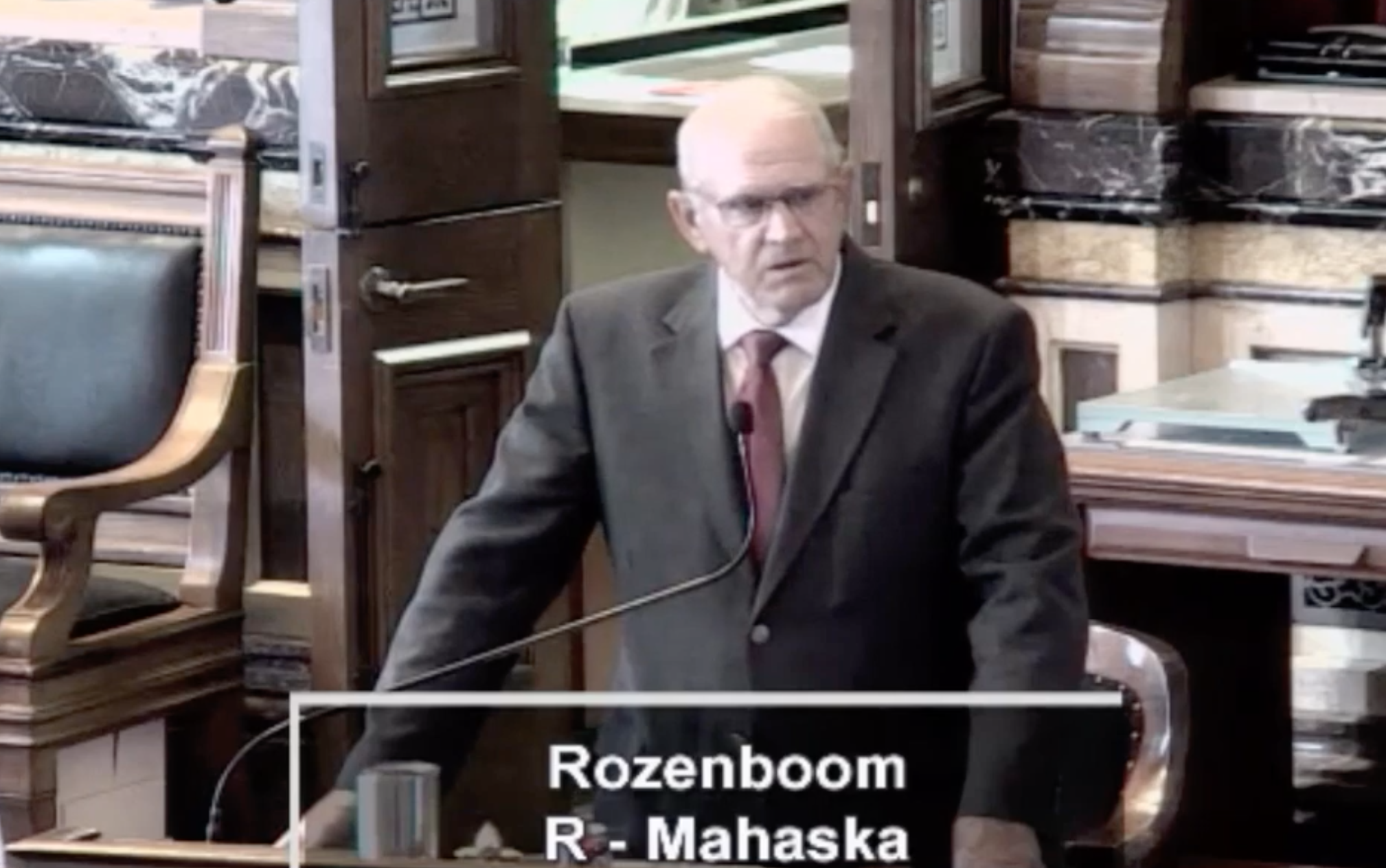Iowa Judge Upholds Ag-Gag Charge Brought Against Animal Rights Activist Hours Before Dismissing The Case

An Iowa judge upheld one of the state’s “ag-gag” laws in a case brought against an animal rights activist, hours before dismissing all charges.
In Iowa, a person may be criminalized for “food operation trespass” if they enter or remain on the property of a factory farm “without the consent of a person who has real or apparent authority to allow the person to enter or remain on the property.”
Matt Johnson, an investigator with the grassroots animal rights network Direct Action Everywhere (DxE), was charged with violating the ag-gag law after he exposed the extermination of pigs by Iowa Select Farms. He argued the law is “actually intended to punish individuals for expressing viewpoints disfavored by the Iowa legislature” and reminded the court that a similar Iowa ag-gag law was previously ruled unconstitutional by a federal court.
State prosecutors abandoned their case two days before trial and moved to dismiss charges, but the court defended the ag-gag charge, which was challenged by Matt Johnson as unconstitutional.
District Court Judge Derek Johnson ruled that the law “does not discriminate on the basis of the viewpoint of the offender. A person who trespasses on a food operation to abuse an animal is treated the same as a person who trespasses on a food operation to rescue one.”
“That is logically true. It’s factually preposterous, and it’s very clear from the legislative history that the intent of this law was to target animal rights activists, people with a particular viewpoint,” replied Wayne Hsiung, an attorney for Matt Johnson and co-founder of DxE.
“You can critique an animal rights activist’s views. You can say that what they’re saying is factually false. What you cannot do under the First Amendment is criminalize their speech, and that is the purpose of this law even if facially it doesn’t say that,” Hsiung added.
Iowa already had a law criminalizing trespassing prior to the passage of the “food operation trespass” law. Trespassing is generally a fine between $65 and $625 with the possibility of up to 30 days in prison. But under Iowa’s ag-gag law, trespassing is an aggravated misdemeanor that carries the possibility of up to two years in prison. A repeat offense may result in a felony charge.
Matt Johnson was charged on July 14, 2020, with “burglary in the third degree” and “electronic or mechanical eavesdropping.” He was later charged under the ag-gag law on April 8, 2021.
The charges came after Matt Johnson captured “video and audio recordings of pigs screaming in agony for several hours as they died. Thousands of pigs were exterminated at Iowa Select Farms using ventilation shutdown after COVID-19 outbreaks caused the closure of many slaughterhouses,” according to a press statement from DxE.
A whistleblower informed the activists of conditions at the factory farm. They rescued a “sickly piglet,” which they later named Gilly. Without saving the piglet, it would have gone to a landfill.
During an afternoon hearing on January 19, prosecutors argued for the dismissal of charges while Matt Johnson contended the charges should be dismissed with prejudice and the prosecutors should be required to outline why they were no longer pursuing the case.
The judge conceded in his order upholding the ag-gag charge that animal rights activists are disparately impacted because “some animal rights advocates have an ideological motive to gain physical access to the food animal operations.” However, he justified the targeting of animal rights activists by contending the law is “facially neutral” and does not “constitute viewpoint discrimination simply because it may disproportionately affect some speakers or messages more than others.”
On that point, Hsiung said the judge is allowing the Iowa legislature to “play games with our constitutional rights.”
Iowa has passed four ag-gag laws. The first two ag-gag laws were struck down in part or in their entirety as unconstitutional because they infringe upon First Amendment rights. According to Hsiung, the state legislature went forward with two laws that were constructed to “cover the same conduct” but avoid “constitutional scrutiny” by targeting anyone with severe penalties instead of only animal rights activists,
Hsiung also stated, “The notion that someone is going to trespass on property to abuse an animal first of all is just pretty factually unlikely. The only abuse of animals that is happening is by people who own the facility and operate the facility.”
Each expansion of ag-gag laws throughout the United States is aimed at suppressing journalism, whistleblowing, and speech around animal abuses. They are designed to protect the interests of agribusinesses and their lobbyists, who are threatened by transparency and accountability.
As of August 2021, such laws in Idaho, Kansas, North Carolina, Wyoming, and Utah, as well as in Iowa, were declared to be unconstitutional in whole or in part.

Matt Johnson told The Dissenter in 2019 he led an investigation into a factory farm owned by Iowa Republican state senator Ken Rozenboom. It was a response to his support for ag-gag laws.
The investigation was released in spring 2020. “Inside the barns, we documented severe rectal prolapses, intense overcrowding with noxious ammonia in the air, and excrement coating the floors. One piglet was unable to stand, gasping for air while thrashing wildly for several minutes before dying before our eyes,” DxE reported.
“It was actually that investigation that led the Iowa Select Farms truck driver to contact us because of the abuse at Iowa Select Farms, which led to the ventilation shutdown exposé,” Johnson shared.
After the ventilation shutdown was exposed at the end of May, Rozenboom backed another Iowa ag-gag law, which passed less than two weeks later. He said the law addressed the “gravest threats to animal agriculture in Iowa.”
Rozenboom discussed how DxE investigated his farm and described the organization as an “extreme animal rights group.” He cheered the law for imposing a felony against animal rights activists who commit a second offense.
The ag-gag law was passed specifically as a response to the investigations and activism of DxE. As Matt Johnson said, it subsequently was used to charge him. He was the “inspiration for the law,” and he became the first person to be charged under the law.
Iowa lawmakers escalated their attacks on journalism and whistleblowing around animal abuse in the food industry in 2021, passing a recording ban that explicitly designates audio or video recording as “trespassing” crimes.
The Animal Legal Defense Fund sued the state of Iowa and argued “the law threatens increased penalties for recording even in public places and locations advocates have long used for public advocacy, such as in open areas of legislators’ offices and parts of businesses in which other members of the public regularly come and go.”


Comments ()